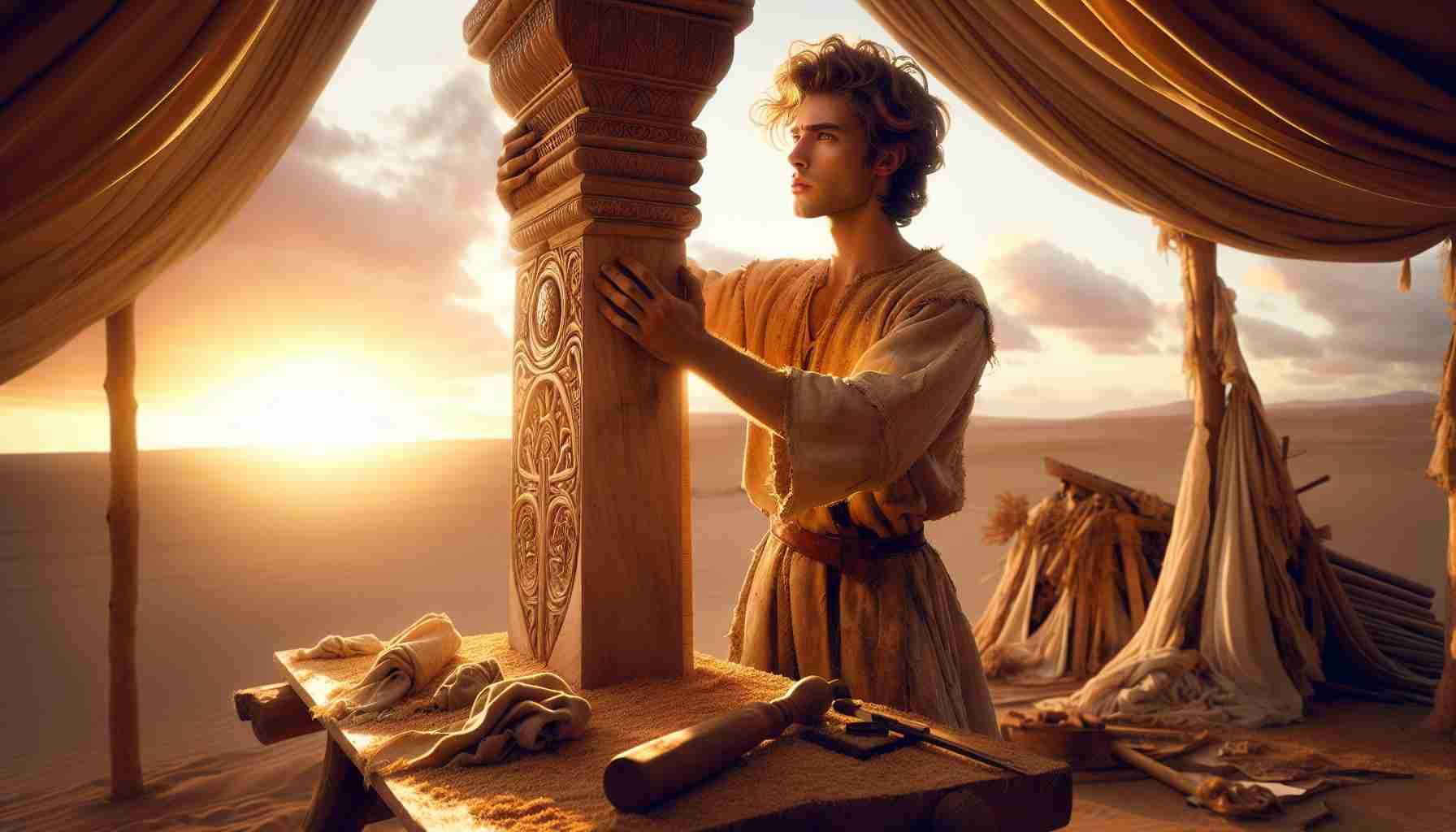

I wasn’t a prophet, just a young woodworker’s son from the tribe of Asher. My name is Talmon. I grew up making bowls, tent poles, and whatever else my father, Gadai, said needed sanding or carving. I knew the rhythm of sawdust in the air and the creak of freshly split wood. But I never imagined that one day, I’d help build a place for Hashem—the name we use to speak of God with reverence.
It started when Moshe—Moses, the leader who led us from Egypt—gathered all of us together. He read us Hashem’s instructions for the Mishkan, a holy place we would carry through the desert. “Each person whose heart moves them,” Moshe said, “bring gifts for Hashem—gold, silver, fabrics, wood, and your skills.”
I remember gripping my sandals with sweaty hands. I wanted to help. I wanted to give something. But we didn’t have gold like some of the others. “Abba,” I whispered to my father that night. “What can we give? We’re not rich.”
He looked at me with his quiet eyes. “We’ll give what Hashem already gave us—our hands.”
So we sharpened our tools and walked to Bezalel—the wise craftsman Moshe had chosen to lead the work. Bezalel, the man from the tribe of Yehudah—Judah—didn’t sneer at me when I offered my help. He looked at my calloused fingers and said, “Show me how you carve a tent peg.”
I did. He nodded and smiled. “Welcome.”
That first day, I helped shape beams from acacia wood. It was hot. My arms ached. But I felt like I was building something bigger than I could understand. Bezalel explained how every piece mattered: the golden clasps to hold the curtains, the loops in the fabric, even the sockets at the bottom of each plank.
Some gifted cloth. Others wove linen or dyed wool. People brought oil for the menorah and stones for the breastplate of Aharon—the first Kohen Gadol, our high priest. No one bragged about what they gave. We just worked. Day after day, we measured, cut, melted, carved, and wove. It was hard, but somehow peaceful. Like our hands were obeying a rhythm that came from Heaven.
One morning, Moshe told us to stop bringing gifts. We had enough. More than enough. I stood in the half-built courtyard and stared up at the long beams we had raised toward the sky. Could God really come here?
When the Mishkan was finally finished, we all gathered outside it. I held my breath. Then a cloud—thick and glowing—descended. The Shechinah, the presence of Hashem, filled the tent.
My knees gave out. I wasn’t afraid. I was full—like the whole journey from slavery had led here. We had obeyed, we had built with faith, and Hashem... had come.
Even now, I carry the scent of that wood in my hands and the memory in my heart: we built a home for God—not with riches, but with willing hearts and faithful hands.
I wasn’t a prophet, just a young woodworker’s son from the tribe of Asher. My name is Talmon. I grew up making bowls, tent poles, and whatever else my father, Gadai, said needed sanding or carving. I knew the rhythm of sawdust in the air and the creak of freshly split wood. But I never imagined that one day, I’d help build a place for Hashem—the name we use to speak of God with reverence.
It started when Moshe—Moses, the leader who led us from Egypt—gathered all of us together. He read us Hashem’s instructions for the Mishkan, a holy place we would carry through the desert. “Each person whose heart moves them,” Moshe said, “bring gifts for Hashem—gold, silver, fabrics, wood, and your skills.”
I remember gripping my sandals with sweaty hands. I wanted to help. I wanted to give something. But we didn’t have gold like some of the others. “Abba,” I whispered to my father that night. “What can we give? We’re not rich.”
He looked at me with his quiet eyes. “We’ll give what Hashem already gave us—our hands.”
So we sharpened our tools and walked to Bezalel—the wise craftsman Moshe had chosen to lead the work. Bezalel, the man from the tribe of Yehudah—Judah—didn’t sneer at me when I offered my help. He looked at my calloused fingers and said, “Show me how you carve a tent peg.”
I did. He nodded and smiled. “Welcome.”
That first day, I helped shape beams from acacia wood. It was hot. My arms ached. But I felt like I was building something bigger than I could understand. Bezalel explained how every piece mattered: the golden clasps to hold the curtains, the loops in the fabric, even the sockets at the bottom of each plank.
Some gifted cloth. Others wove linen or dyed wool. People brought oil for the menorah and stones for the breastplate of Aharon—the first Kohen Gadol, our high priest. No one bragged about what they gave. We just worked. Day after day, we measured, cut, melted, carved, and wove. It was hard, but somehow peaceful. Like our hands were obeying a rhythm that came from Heaven.
One morning, Moshe told us to stop bringing gifts. We had enough. More than enough. I stood in the half-built courtyard and stared up at the long beams we had raised toward the sky. Could God really come here?
When the Mishkan was finally finished, we all gathered outside it. I held my breath. Then a cloud—thick and glowing—descended. The Shechinah, the presence of Hashem, filled the tent.
My knees gave out. I wasn’t afraid. I was full—like the whole journey from slavery had led here. We had obeyed, we had built with faith, and Hashem... had come.
Even now, I carry the scent of that wood in my hands and the memory in my heart: we built a home for God—not with riches, but with willing hearts and faithful hands.